- Sunset Healing Arts Center5075 SW Griffith Dr, Suite 210
Beaverton, OR 97005 Patricia Hallam, LAc
(503) 421-9339
Book online!Daivati Bharadvaj, ND
(503) 484-8647
Book online!Nanci Williams, LMT
(503) 939-9123William Wilson, LMT
(503) 956-9031
Fax number: (503) 530-8174
- Sign up to receive news and updates and get this free report:“The Top 10 Reasons to Try Acupuncture”

-
Latest Articles:
- • Spring Clean Your Way to Better Health •
- • 5 Healthy Ways to Embrace the Spring Season •
- • Fun Things to do this Spring •
Health WellNews
Cupping in Chinese Medicine
Have you seen those dark purple cup marks on the upper back of your favorite celebrity lately and wondered what that was all about? That is from an ancient Chinese medicine technique called cupping, which is a wonderful and effective supplement to an acupuncture treatment.
Cupping describes the practice of Chinese medical practitioners using thick glass cups in certain regions of the body to relieve pain and for other medicinal uses. In what is called “fire cupping,” the acupuncturist takes the glass cup, saturates a cotton ball with alcohol and applies a small flame to the cotton. The cotton is then placed in the glass cup (with lightning speed and accuracy) whereby the oxygen is removed from the glass and the skin is suctioned up tightly. What the cup is doing is drawing pressure out and up. Nowadays, some practitioners use plastic suction cups or cups made of bamboo.
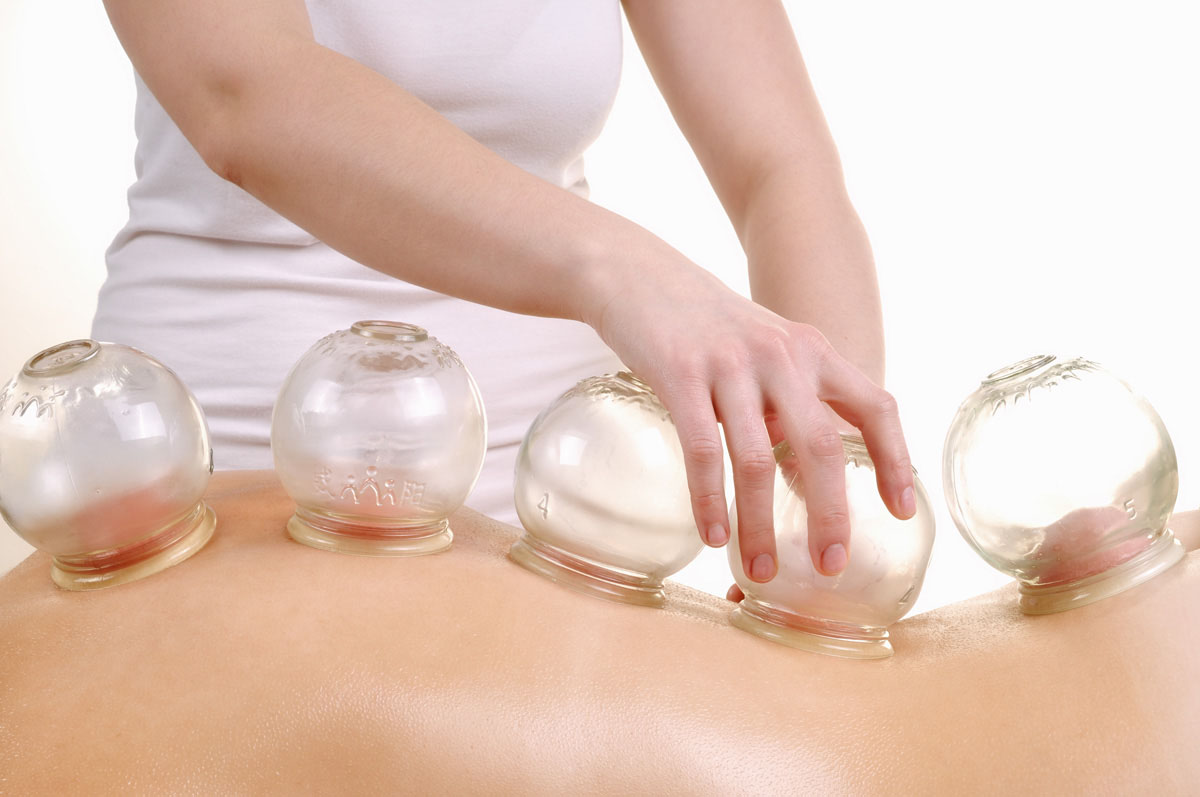
There are two types of cupping: one is “dry cupping” and is the most common. This is where the cup stays put for about five minutes or more. The acupuncturist may in some instances use a small lancet to draw out a tiny amount of blood from an area before placing the cup over the region in what’s called “wet cupping.” The next type is called “moving cupping” and is the most pleasurable experience. This is when oil is put on the skin before the cup is suctioned so that the cup can be moved along a large region, for example, down your back. This feels like a massage and is very relaxing and helpful for stiffness. Multiple cups are typically used for any of these forms of cupping.
Why cupping?
Cupping promotes blood flow, eases stiffness and pain, especially in the back, neck, and shoulders and lifts tense muscles. By promoting better circulation through cupping, tissues receive vital nutrients and oxygen. Cupping releases stagnation of blood and lymph fluid and removes harmful toxins. It has been shown to help respiratory ailments and the common cold, muscle conditions, stress, arthritis, digestion and gynecological issues.
Cupping feels wonderful during and after treatment, but any bathing suit modeling or cruise vacations should be postponed a few days after therapy due to local redness or purple color and perhaps bruising of the area. You might have a small cup mark, but this is very common, it should dissipate in a couple of days, and is not harmful. Of course, if you experience any other acute complications, see your physician.
Certain conditions are contraindicated for cupping techniques and your acupuncturist will advise against treatment. These conditions include broken skin, skin ulcers, high fever, inflammation, thin skin that bleeds easily, pregnancy (no cupping on the abdomen) and bony areas of the body.
Cupping is an old therapy, and although some patients have mentioned seeing their grandparents apply cupping using glass jars, it is not recommended to self-diagnose or to try fire cupping at home on your own. It can be dangerous and you could get a severe burn or blisters. See your friendly acupuncturist to give you a relaxing cupping treatment that is both safe and effective.
The Liver: Mental & Emotional Aspects
According to Traditional Chinese Medicine (TCM), the organ connected to springtime is the liver. The liver is connected to the wood element, which refers to living and growing things like plants, trees and humans. In TCM, practitioners use the mental and emotional characteristics of the liver to diagnose and treat imbalances in their patients as well as its physical manifestations.
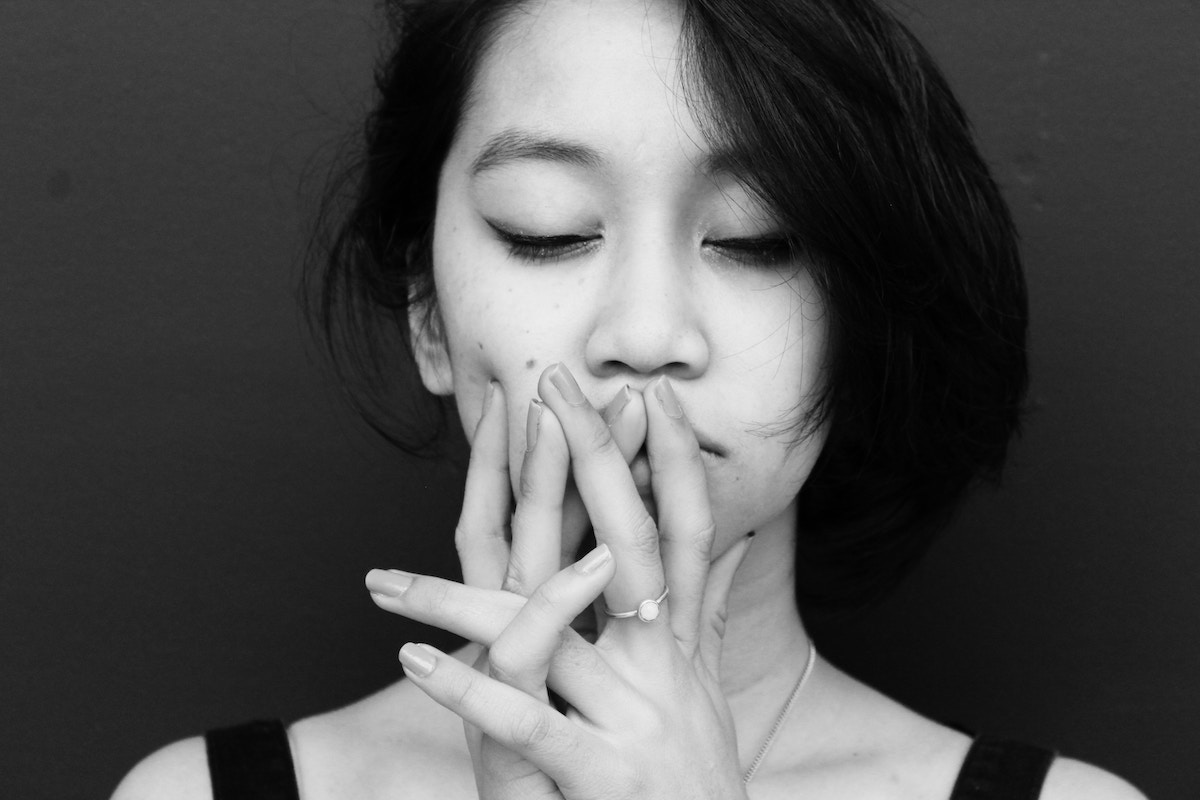
When the emotional aspects of the liver are working as they should, you are able to stand firm in your convictions, with proper boundaries between you and others around you. The liver influences confidence and assertiveness, and the ability to make decisions and stick by them. The liver also has a lot to do with stress and anger. Physically, an imbalanced liver can create tight tendons, necks and shoulders, and emotionally it can lead to a tightness of the spirit.
The key emotions of the liver are anger and frustration. So what would lopsided liver energy look like to a casual observer? Imagine this: a red-faced hypertensive man waiting impatiently in line at a store, huffing and puffing because he has to wait like everyone else. He is pointedly looking at his watch and glaring at the cashier. Every once in awhile he bumps into the woman in front of him as he checks his watch, and she moves back, submitting to him and allowing him to take over her personal space. He is becoming more and more furious by the minute, because he is late for his scheduled activities. Most people would describe this guy as controlling and overbearing, but in the world of acupuncture, his liver energy is simply out of sync.
When the liver isn’t doing its job, everything in the body tends to rise upward. In these types of patients, you can often see the physical manifestations of their emotional state. These patients might hold everything in their bodies in a tight, rigid manner. They often clench or grind their teeth in anger and frustration. Their faces might be suffused with color. That doesn’t mean all people who have a liver imbalance act this way, or that the liver is responsible for creating miserable “Type A” individuals. This liver energy is necessary for keeping us on track. Without it, we wouldn’t have a sense of purpose, and we wouldn’t be able to get anything done.
The key is balance. We could take another look at that line the angry man was in, and take into consideration the woman who was bumped into. Her imbalance of liver energy in the opposite direction creates a lack of boundaries, allowing her to have a “pushover” mentality. When someone steps into her personal space, she steps back. She lacks the assertiveness that a strong liver energy can bring forth.
When kept in a state of equilibrium, the liver can move us toward our goals, allowing us to plan and follow a steady course. It can keep us on track with our plans and ambitions, and protect us from those who want to cross our boundaries and take our energetic reserves.
What’s Inside Your Medicine Cabinet?
Springtime is a natural time for cleansing, whether in terms of cleansing the diet or clearing out the garage. In this article, we’ll offer some spring cleaning for your medicine cabinet: natural remedies to allow you to literally clear out old bottles and internally cleanse your body of synthetic medications.
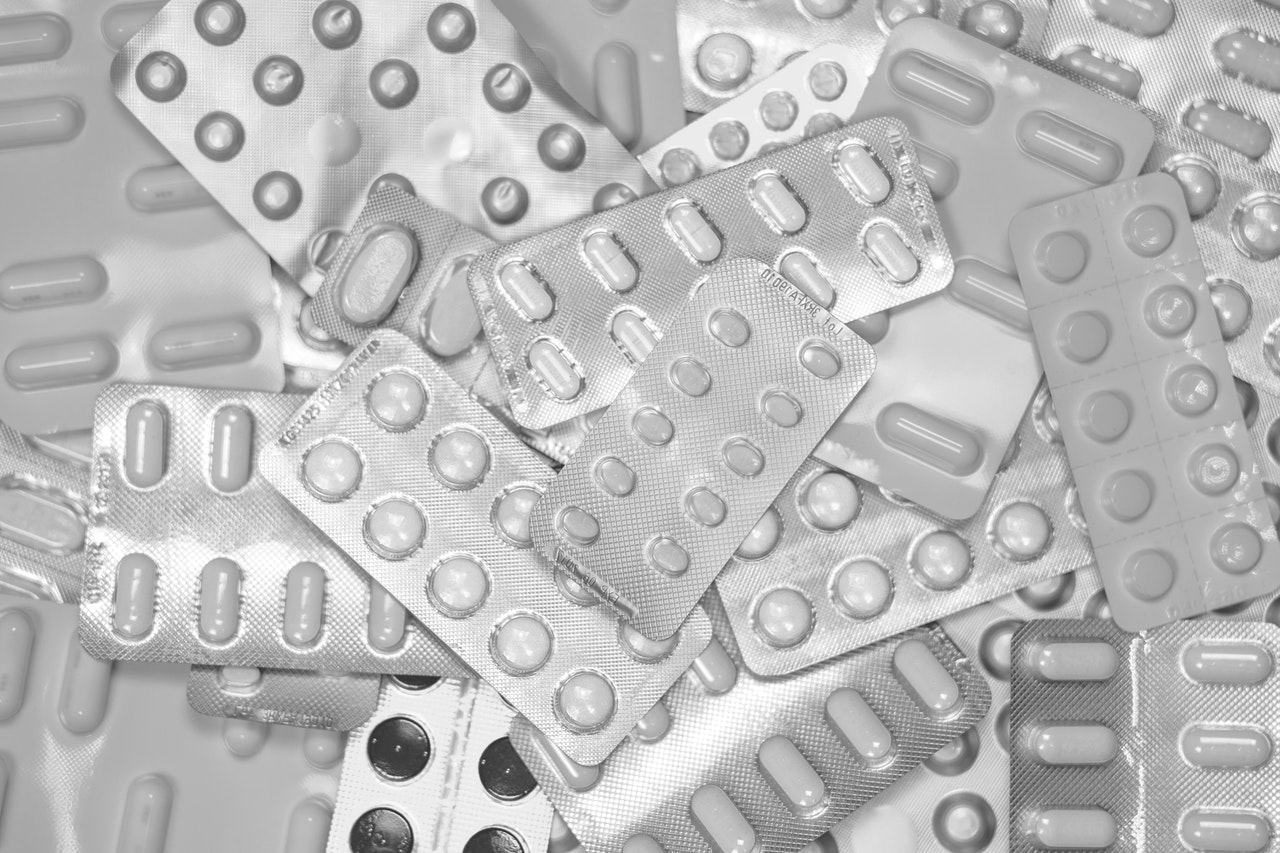
We all have a medicine cabinet, drawer or cupboard in our homes filled with seemingly harmless over-the-counter drugs, bandage material and other toiletries. Unfortunately, many of the things in your medicine cabinet can be potentially dangerous and even lethal. The good news is, a lot of these items can be replaced with natural substitutes.
Painkillers / Anti-inflammatories
Painkillers like ibuprofen and naproxen can be effective for relieving a headache or reducing inflammation in the joints. But these medications were not designed to be taken on a long-term basis and here’s why: Long term usage of NSAIDS (non-steroidal anti-inflammatory drugs) has been proven to eat away at the lining of the gastrointestinal tract, which can then lead to ulcers. They also can increase the risk of heart attack, heart failure and stroke, even in people who have no existing heart conditions. So, when you have achy joints or a headache, reach for something more natural. Turmeric and/or ginger are wonderful natural substitutes that can be taken daily to help reduce the pain and inflammation associated with achy joints. For headaches, try a dab of peppermint or wintergreen essential oil on the temples. You can also try eating pineapple regularly. Pineapple contains an enzyme called bromelain. Bromelain is known to reduce inflammation.
Heartburn and Indigestion Medications
Many people suffer from heartburn and indigestion and then reach for proton-pump inhibitors (PPIs) like omeprazole or pantoprazole. These medications are proving to be more harmful than helpful, though. Numerous studies have linked long term use of PPIs to kidney failure and even dementia. But for those who suffer with heartburn, it’s a really tricky balancing act that ultimately comes down to what they eat. The pain can be excruciating. PPIs reduce stomach acid in the gastrointestinal tract, thus reducing pain. Over time though, users of PPIs can wean themselves off these sometimes harmful medications. Substitutes like aloe vera juice, organic apple cider vinegar, baking soda and cranberry juice can all help reduce excess stomach acid production naturally. Ginger and peppermint can soothe the pain associated with acid reflux, heartburn and indigestion.
Cough Syrup and Cold Medications
Even the healthiest of people will get sick at some point. Over-the-counter (OTC) cough and cold medicines are abundant and while some may work, they can come with some potentially harmful side effects. Dextromethorphan hydrobromide is a cough suppressant and promethazine is an antihistamine. Both are commonly found in OTC cold medications. These drugs can cause hives, difficulty breathing, facial swelling, dizziness, anxiety, restlessness and nausea, just to name a few of the side effects. There is also the potential for abuse if not taken properly. But again, there are natural substitutes that have no side effects and in many cases work more effectively. Honey not only helps with a cough, but it also soothes a sore throat. Pineapple juice is another great cough suppressant. Peppermint and thyme are also good for suppressing coughs and opening the sinuses.
When opening up that medicine cabinet, think about this: Nearly every OTC medication was once derived from a natural precursor. Aspirin, for instance, is derived from willow bark, and the main reason it is now produced in synthetic-pill form is that somebody saw an opportunity to make money. So before you pop a pill, consider seeking a natural remedy first. This includes things like traditional Chinese medicine. Acupuncture plus herbal formulas can be a wonderful alternative to those harmful medications. Also, don’t forget to evaluate your daily diet. Diet can play a big role in how your body heals. Making minor adjustments to your eating habits and adding acupuncture to your health regimen can alleviate stress, decrease pain and boost your immunity. Remember, you ultimately have the choice when it comes to your health and what you put in your body. Be sure to take the time to make informed decisions that aren’t detrimental.
How Weather Affects Pain
Almost everybody has heard one of their relatives complain about how painful their joints become when the weather changes, especially when it gets cold or rainy. But is there any validity to this claim? And what about people who live live in consistently cold, rainy or damp climates? Do they have the same complaints about body aches and pains? The short answer is both yes and no. There is some truth to this, but it might not be what you think.

Achy joints, arthritis flare ups and intense migraines are just some of the ways people can predict the weather coming. And while it may seem far-fetched, there is something going on there. Scientists have studied this, but even they can’t agree. There are however, several theories why weather affects pain. The most common theory is air pressure, or barometric pressure, is what is actually affecting pain levels.
Barometric pressure is the weight of the atmosphere that surrounds us. Just before a storm hits, barometric pressure drops. The lower air pressure allows the tissues to expand and this can lead to added pressure on the joints. This may increase pain in those areas.
Another theory is more psychological. It is well documented weather can affect a person’s mood. When a person feels gloomy or depressed, their perception of pain can be increased. This happens frequently in areas where winters are long and cold. It even has a name: Seasonal Affective Disorder or SAD.
One thing for certain is our bodies adjust to our environments. A recent study looked at people in four cities: Nashville, San Diego and two cities in Massachusetts. The study concluded people experience changes in their pain when the weather changed no matter where they lived. Pain worsened when the barometric pressure fell, which occurs right before a storm or drastic weather changes. And since our bodies adjust to our environment, it is safe to say no matter where a person lives, their pain will go with them. They may not notice it as much at first after moving to a new climate, but eventually it will come back.
The weather affects our bodies in other ways too. High levels of humidity can thicken the blood over time. This can increase the pressure in the blood vessels and the heart. This causes the heart to work harder to pump the blood throughout the body and may ultimately lead to a stroke or a heart attack. Those living in high humidity climates also have to worry about excessive sweating that can lead to dehydration. When the body is dehydrated, the joints ache more. This is why drinking water is so important, not just in high humidity areas, but everywhere.
Regardless of the cause, acupuncture and Traditional Chinese Medicine can be very helpful in the treatment of aches and pains. No matter where you live, Traditional Chinese Medicine can help.
5 Reasons to Try Acupuncture This Winter
Winter is one of the five seasons acknowledged by Traditional Chinese Medicine. The ancient Chinese followed the belief humans should live in harmony with the cycles of nature. During the winter months, darkness and cold indicate we should slow down, take care of our health, conserve our strength and replenish our energy for the upcoming spring and summer months.
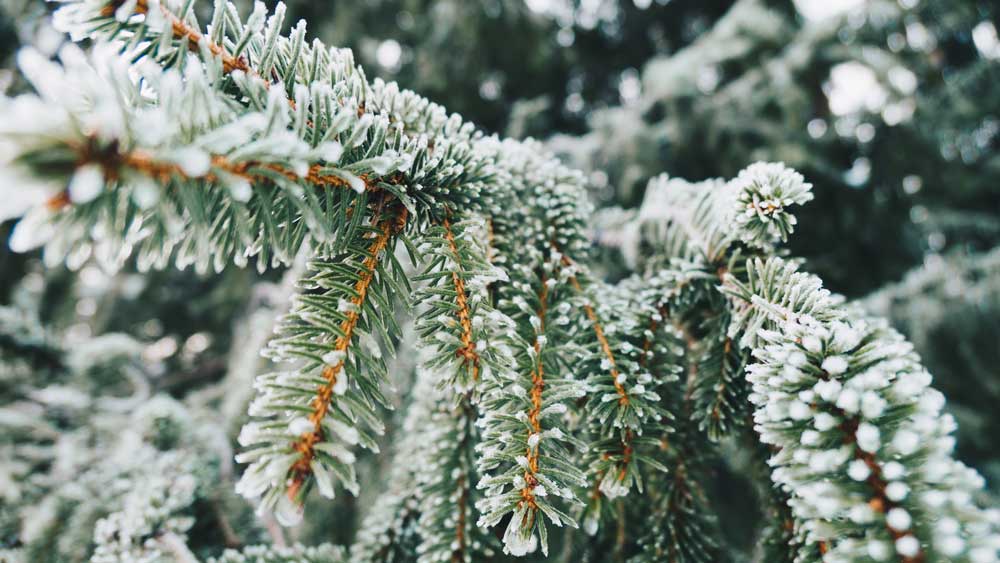
Each season has multiple associations that help us adjust our habits as things change, which makes it easier to keep the body and mind balanced. Winter is ruled by the water element. The water element is associated with the kidneys and urinary bladder. According to Traditional Chinese Medicine philosophy, the kidneys are the source of all energy found within the body. This energy is what keeps us alive and allows our bodies to function properly. During the winter months, it’s vital we nourish and nurture our kidney energy.
Winter is typically a time when we decrease our daily activities. For many people, this coupled with longer hours of darkness, can lead to Seasonal Affective Disorder. This form of depression occurs during the winter months. It can be very debilitating for those who suffer from it. But acupuncture can help. Studies show regular acupuncture treatments can be as effective as prescription medications for treating depression and seasonal affective disorder.
The most common ailment that occurs during the winter months is the cold. The cold is a viral infection of the upper respiratory tract, nose and throat. Because we’re not as active during the winter months, our immunity tends to be lowered and this is when the cold viruses can attack. While colds usually have to run their course, acupuncture can help shorten the length of the cold and drastically decrease the symptoms.
Over the past decade or so, the norovirus has become more prevalent during the winter months. This particular virus causes gastroenteritis or gastrointestinal tract disorders like diarrhea. During the initial few days of a norovirus attack, people need to stay home and hydrate themselves. But once the diarrhea becomes less frequent, acupuncture can be very helpful in decreasing the symptoms and boosting the person’s immunity.
5 Ways to Help You Wake Up and Get Active
Everybody experiences times where they have no motivation. Lack of motivation can be caused by many things: the weather, depression, nutritional deficiencies, rejection and even not exercising. For many, this seems contradictory. If I have no motivation, how am I supposed to go exercise? Well, it all comes down to choices and doing what is best for your body.
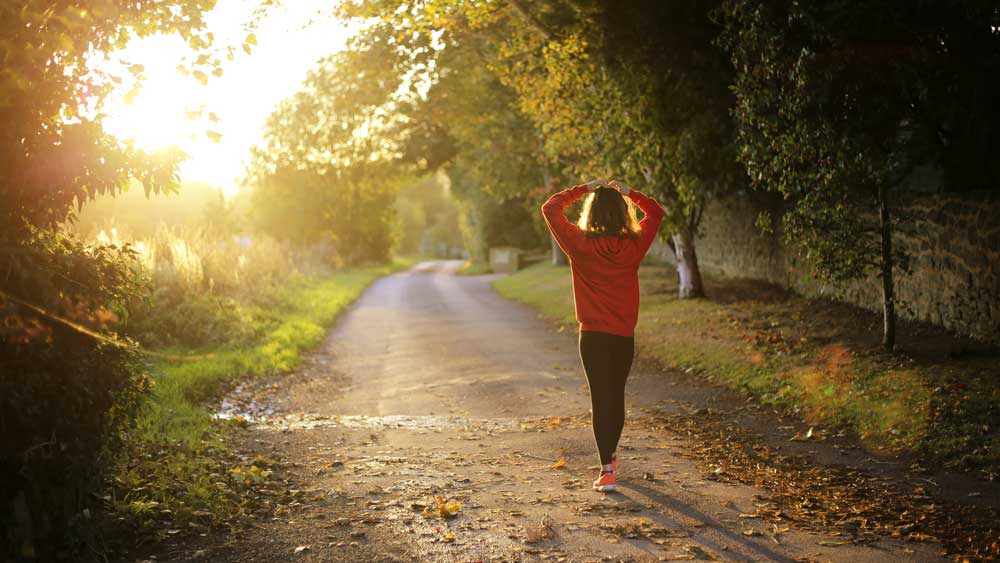
Lacking motivation can be detrimental to your health. Even though everybody knows they should be exercising, eating right and getting proper sleep, many of us choose not to. This becomes a bad habit that can actually develop into depression, fatigue, insomnia and even nutritional deficiencies that cause worse physical problems. We tell ourselves we don’t have time or we have no motivation or willpower. These are just stories we tell ourselves. Everybody has time to care for themselves. It’s just a choice we have to make. So here are some ways to help us wake up, get motivated and get moving.
ACUPUNCTURE
Acupuncture can help put the pep in your step when it comes to motivation. In Traditional Chinese Medicine (TCM), lack of motivation is considered a sort of blockage along the energetic pathways that run throughout the body. Most commonly, this affects the gallbladder and liver pathways. Over time, this lack of motivation frequently develops into depression. When the body is depressed, nothing seems possible. But there are underlying causes to depression that begin with lack of motivation.
FENG SHUI
This ancient art is used to energetically balance the home through the placement of the furnishings inside. The bedroom is particularly important because we spend so much time there. Feng Shui tells us your bed should be placed where it allows you to see the door without being in the direct path of the door opening. This allows for a sense of security, which can lead to more restful sleep.
GRATITUDE
Being thankful for everything you have in your life really does make a difference. Instead of seeing the day ahead of you as a burden and worrying about everything you have to do, be thankful you woke up again. This will shift how you look at things throughout the day and the rest of your life.
EXERCISE
Whether you’re a gym rat or not, exercise is vitally important. Going for a walk or a jog first thing in the morning can be refreshing and get the blood pumping. Studies show regular exercise in the morning can actually lead to more energy the next day.
MEDITATE/PRAY
Meditation and prayer allow the body to relax and the mind to calm down. Using this tool shortly before going to bed can be very beneficial. And as we all know, when the mind is quiet, the body relaxes more and we get better, more restful sleep, which gives us more energy and motivation to tackle the next day.
Try incorporating one or all of these practices into your life and see how much it affects you. And remember, studies show it takes 21 to 30 days of doing something consistently for it to become a habit. Are you up for the challenge?
5 Reasons to get Acupuncture this Fall
Fall is a favorite season for many people. The weather starts to get a little cooler, things begin to slow down and preparations for the holidays are in full swing. For many others, fall is not so festive. Many people get sick during the fall months, allergies can flare up and many don’t like that the hours of sunlight decrease steadily, sometimes leading to seasonal depression.
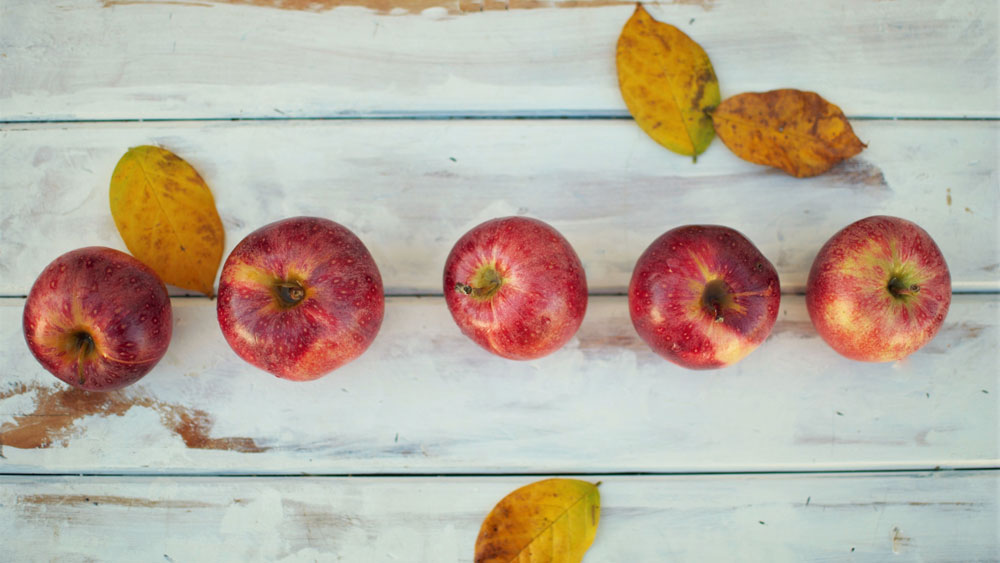
There are many reasons to get acupuncture during the fall. One of the biggest reasons is to avoid getting sick as the seasons change. In Traditional Chinese Medicine (TCM), fall is associated with the lung and large intestine energetic pathways. These two pathways work symbiotically to control the immune system from both the inside and outside of your body. And, if you take good care of these energetic pathways during the fall, you are bound to feel better throughout the season. But just to be sure, getting regular acupuncture treatments might be a good idea. It is recommended to start a couple of weeks before fall really kicks in.
Autumn is associated with the element of metal. According to TCM, the element of metal governs the mind, order, stability and organization. As fall approaches, we tend to be more reflective, turning inward and going into hibernation mode. It’s a great time to organize and prepare for the upcoming winter months. Emotionally, fall is associated with sadness and grief. Therefore, as the nights get longer, it is very important to keep the mind clear and let go of your negative emotions. Acupuncture can be a wonderful tool to help ward off depression, sadness and grief, both before and during the months of fall. Acupuncture treatments help balance moods by regulating hormones in the body.
For those who love the long hours associated with the summer months, fall is not easy to slide into, especially when it comes to sleep. Many people have difficulty going to sleep earlier, which is recommended when the days begin to shorten. This is where acupuncture can be beneficial. Certain acupuncture points are very effective at calming the mind and helping induce rest and relaxation. This is why so many people who receive regular acupuncture tend to take a nap while the treatment is taking place.
Getting a handle on stress before the full swing of the holidays hits is always a good idea. Acupuncture can help with that too. Acupuncture treatments are very relaxing for the majority of people. Around the holidays, people experience high levels of stress. But receiving regular acupuncture treatments ahead of the holidays, will allow for a smooth holiday season.
Lastly, acupuncture can help control, or at least tone down the allergy flare ups that frequently occur during the fall. This goes back to how acupuncture works on the immune system. But many people who suffer from allergies only experience minor symptoms, like a runny nose and watery, itchy eyes. A few little needles can help tremendously with allergy symptoms.
So what are you waiting for? Fall into hibernation mode through the use of acupuncture.
Herbal Tonics for Fall
Fall is a time of transition for nature, as well as our own bodies. In Traditional Chinese Medicine (TCM), each season is associated with specific organ systems. During the autumn months, the lung and large intestine energetic meridians are in control. It is extremely important to improve lung function during the fall months to allow for an easy transitional period and to prepare for the upcoming winter months.

The lung system in TCM is responsible for the body’s immunity or Wei Qi (pronounced “way chee”). When the Wei Qi becomes depleted or deficient, the body becomes ill. And during the fall months, when the weather is transitioning and temperatures are falling, it becomes vital to take precautions so the immune system and Wei Qi don’t fail our bodies, allowing disease to take root. The most common diseases of the fall season are allergies, colds and the flu. But there are ways to boost or tonify the Wei Qi.
Traditional Chinese Medicine utilizes many different modalities to help keep the body free from disease. These modalities include acupuncture, moxibustion, nutrition, qi gong, tai chi and herbal formulations. It is these herbal formulations we are discussing today.
Chinese herbal medicine has been used for millennia to keep the body free from disease and to help remove disease when it attacks. Herbs can be used alone or combined to make stronger herbal formulas. And while not all of the herbs we will discuss here are specific to TCM, they can be found and utilized easily.
Astragalus or Huang Qi: This herb is a favorite among TCM practitioners. It is an excellent tonic herb, as well as an adaptogen that can be used year-round to ensure good health. In TCM, it is considered to be one of the best tonic herbs available, especially for those who are already fatigued. Specifically, this herb is known for its ability to strengthen the Wei Qi.
Cordyceps or Dong Chong Xia Cao: This herb is known to enrich the bone marrow, where white blood cells are made. White blood cells are a large part of the immune system and they specifically fight off infections in the body. In this way, Dong Chong Xia Cao definitely plays a role in tonifying the Wei Qi. This herb is also used to replenish the adrenal glands when there is adrenal fatigue. When the adrenals are fatigued, the whole body is running at a deficient level.
Reishi Mushroom or Ling Zhi: This herb is sometimes called the “great protector” because it guards the body against the detrimental effects stress can have on the physical body. When taken regularly, it has been shown to improve immunity, while also calming the nerves. Specifically, it can help inhibit tumor growth in both breast and prostate cancer.
As you can see, herbs can be very beneficial and help keep the body free from illness. The herbs mentioned above are just a few examples that would be good to have around during the season of fall to help boost your immune system.
Acupuncture and Hay Fever
Hay fever, which is medically termed allergic rhinitis, is an ailment that affects nearly 20 million people in the United States, according to the Centers for Disease Control. Hay fever is actually an allergy caused by pollen or dust, which causes the mucous membranes of the eyes and nose to become itchy and inflamed, resulting in sneezing, a runny nose and watery eyes. Hay fever is the fifth most common disease in the United States and it tends to affect people during three out of the four seasons in the year. There are multiple over-the-counter medications to treat hay fever, including antihistamine sprays, eye drops and nasal corticosteroids.

The problem with most of these suggested treatment methods is they all have adverse side effects. Traditional Chinese Medicine (TCM), however, can treat the symptoms without any harsh side effects. A TCM practitioner has a whole host of modalities in their toolbox that can help the hay fever sufferer. This includes acupuncture, herbal formulas and nutritional counseling. When these tools are used in conjunction, studies have shown hay fever sufferers may experience a significant drop in their symptoms.
According to TCM theory, hay fever is usually attributed to a deficiency of the body’s essential energy or Qi (pronounced “chee”), coupled with an invasion of wind heat in the lungs. But every patient is different and symptoms may differ from person to person. For most hay fever sufferers, TCM treatments will aim to open the lungs and expel the wind heat.
Acupuncture is a holistic medical technique that uses hair-thin solid stainless steel needles to stimulate acupressure points on the body. These acupressure points can do many different things, including reducing inflammation, decreasing lacrimation (watery eyes) and relieving sneezing. According to one study done by the Lishui Hospital of Traditional Chinese Medicine, when acupuncture was used as a standalone therapy, the participants reported a nearly 67 percent decrease in their symptoms. When herbal formulas were added, that efficacy rate increased to over 71 percent.
There are several herbal formulas that can be used to treat hay fever. The one used, will depend on the specific symptoms of the patient. However, the base formula frequently used is known as Cang Er Zi San. The herbs in this formula can unblock the sinuses and alleviate pain. The biggest difference between over-the-counter remedies and TCM herbal formulas is the formulas can be changed as the person’s symptoms change.
Acupuncture improves the Qi throughout the body by stimulating the body’s own internal regulating systems. This will then allow the body to heal itself, by strengthening the body’s resistance and regulating the antigen/antibody reaction created by the body when it encounters pollen or dust that may trigger the hay fever attack. And since hay fever is attributed to having a weak immune system in TCM, the herbs usually given will help support and strengthen the person’s immunity.
This is also where nutritional counseling may play a part because many foods can create phlegm and dampness that exacerbate a person’s symptoms. Things like dairy and excess sugar may need to be avoided during the flare-ups. Also foods that generate or create heat are usually not advised. However, drinking plenty of water is always a good idea.
We can help determine if you are a good candidate for treatments and also help you to avoid suffering in the first place, as this medicine can and should be used as preventive medicine.
Acupuncture and Maintaining Healthy Skin
Health is something most people strive for every single day. Our skin is the outward expression of how healthy or unhealthy we are. And while many people believe makeup is the ultimate way to enhance your appearance, many times it is only hiding underlying health issues. Vanity is a virtue that can be quite unbecoming, expensive and time consuming. In the United States alone, people are expected to spend nearly $11 billion on skin care by 2018, according to Global Cosmetic Industry Magazine. And all of the money being spent is out of pocket, meaning technically it is considered a luxury item and not a necessity.

Healthy skin is something that can be representative of much more taking place inside the body. When our skin is dry, cracked, dull, lackluster or covered by acne, it can indicate serious imbalances within the body. This is where things like acupuncture and Traditional Chinese Medicine can be very beneficial. Cosmetic acupuncture is considered the truest form of anti-aging medicine because it improves the look of the skin, while still optimizing overall health. Beauty and health are inseparable and therefore, they should be addressed together.
Cosmetic acupuncture still follows all the same principles of Traditional Chinese Medicine. Acupuncturists specializing in cosmetic acupuncture do a thorough intake and health assessment to determine any internal imbalances. And while the ultimate goal for the patient is to have healthier looking skin, the acupuncturist will treat according to the internal imbalances. Once these imbalances are corrected, the skin will become healthier. This is not to say that cosmetic acupuncturists don’t directly treat the visible skin issues, because they do.
Cosmetic acupuncture utilizes tiny sterile needles placed in and around areas of the skin that may be dull, saggy, wrinkled, inflamed or even have some sort of deformity. The insertion of these needles will do a couple of things that help the skin to heal. First, the needles will activate collagen production in areas that have become sunken or wrinkled. This will help to fill in those areas and decrease the lines. Secondly, the needles will stimulate an immune response. This triggers the body to send immune cells to the affected areas, thus signaling molecules like growth factors and cytokines, to repair the skin.
However, cosmetic acupuncture cannot be relied upon completely to help the skin repair and replenish. Most cosmetic acupuncturists will also coach their patients about proper diet and other health issues that may be contributing to the appearance of the skin. For instance, did you know excessive stress can actually cause us to age faster and look older? This is another way that acupuncture can help keep the skin healthy. When a person is extremely stressed, the body reflects it through the skin. Stress can cause breakouts due to an increase in hormones, making the skin oily and decreasing the body’s defenses against bacteria. This is why adequate sleep is so important.
Improper diet is another area a cosmetic acupuncturist may discuss and one that is vital for healthy skin. Things like green tea, vitamin C and Omega-3 fatty acids are wonderful items to add to the daily diet if you are trying to keep the skin healthy. Green tea is full of antioxidants and anti-inflammatory components that help soothe and reduce skin redness. Vitamin C has been shown to increase collagen production, especially when applied topically. But taking Vitamin C internally also increases antioxidants that keep the skin healthy. Lastly, Omega-3 fatty acids, help keep the skin looking youthful, while retaining its elasticity.
Cosmetic acupuncture is a quickly growing sector of Traditional Chinese Medicine. If you are dealing with any kind of skin issue and looking for a natural way to treat it, finding a licensed acupuncturist would be a great place to start. Your skin and body will thank you.

